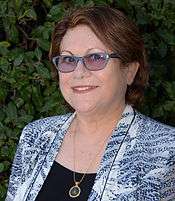Hermona Soreq
Hermona Soreq (חרמונה שורק) is an Israeli professor of Molecular Neuroscience at The Hebrew University of Jerusalem.[1] Best known for her work on the signaling of acetylcholine and its relevance in stress responses and neurodegenerative diseases such as Parkinson's and Alzheimer's.
Hermona Soreq | |
|---|---|
 Prof. Hermona Soreq, November 2013 | |
| Born | Hermona Even April 3, 1947 Tel Aviv, Israel |
| Nationality | Israeli |
| Alma mater | Tel-Aviv University The Hebrew University of Jerusalem Weizmann Institute of Science |
| Known for | Research in acetylcholine signaling |
| Scientific career | |
| Fields | Molecular Neuroscience |
| Institutions | The Hebrew University of Jerusalem |
Biography
Soreq (née Even) was born in Tel-Aviv. She completed her B.Sc. in Biochemistry and Microbiology at the Hebrew University, M.Sc. in Biochemistry from Tel-Aviv University and Ph.D. in Biochemistry from the Weizmann Institute in 1976. From 1977 to 1979, she was a post-doctoral Fogarty fellow, in Molecular Cell Biology, at the Rockefeller University, New York.
Scientific career
Soreq started her scientific career in the Weizmann Institute, where she served as Senior Scientist and then Associate Professor (1979-1986). In 1986 she became an Associate Professor of Molecular Biology in the Department of Biological Chemistry at the Hebrew University of Jerusalem. In 1989 she gained her professorship there and set up her laboratory. She has run her lab there, ever-since. She served as the head of the Silberman Institute of Life Sciences at the Hebrew University (1995-2000). In 2000 she was elected as President of the Israeli Society of Biochemistry and Molecular Biology, and served as such till 2002. In 2005 she was elected to serve a term of 3 years as the first female Dean of the Hebrew University's Faculty of Science [2]
In 2011, a lab team member, Liat Benmoyal-Segal, published a paper together with Soreq[3] indicating the relevance of a variant of the acetylcholinesterase protein in the treatment of Parkinson's. Protalix BioTherapeutics developed the variant, PRX-105, and began phase I clinical trials.[4][5]
Today, Soreq is The Charlotte Schlesinger Professor of Molecular Neuroscience at the Silberman Institute for Life Sciences and a founding member of the Hebrew University’s Edmond and Lily Safra Center for Brain Sciences. Her research is focused on the mechanisms underlying malfunctioning of communication by the neurotransmitter acetylcholine in muscle, nerves and blood cells, which involves changes in pre-mRNA processing and microRNA regulators, and may be manipulated by Oligonucleotide-mediated therapeutics (successfully completed Phase II clinical trials for treating inflammatory bowel disease)[6][7] that can be also relevant for anxiety-related, neuromuscular and neurodegenerative (Parkinson's and Alzheimer's) diseases. She is the author of over 280 peer-reviewed journal articles and 8 books
Awards and honors
Soreq serves on the boards of the Hebrew University, the Technion (Israel Institute of Technology) and Yissum (the Research Development Company of the Hebrew University). She is also an Adjunct Research professor at the Arizona State University Biodesign Institute. Her awards and honors include:
- 2005 Landau Prize for Biomedical Research
- 2008 Kaye Prize for Innovative research, The Hebrew University[8]
- 2009 The Lise Meitner Alexander von Humboldt Foundation Award, Germany
- 2009 Visiting Miller Professorship,[9] University of California, Berkeley
- 2013 National Center of Excellence (I-Core) on Trauma,[10] member of Scientific Management
- 2013 Advanced ERC Research Award
She has also received honorary Doctorates from the University of Erlangen, Nűremberg, Germany (2007), Ben-Gurion University of the Negev, Israel (2007) and the University of Stockholm, Sweden, (1996)
Publications
- Loewenstein-Lichtenstein, Yael; Schwarz, Mikael; Glick, David; Nørgaard-Pedersen, Bent; Zakut, Haim; Soreq, Hermona (1995). "Genetic predisposition to adverse consequences of anti–cholinesterases in 'atypical' BCHE carriers". Nature Medicine. 1 (10): 1082–5. doi:10.1038/nm1095-1082. PMID 7489367.
- Friedman, Alon; Kaufer, Daniela; Shemer, Joshua; Hendler, Israel; Soreq, Hermona; Tur-Kaspa, Ilan (1996). "Pyridostigmine brain penetration under stress enhances neuronal excitability and induces early immediate transcriptional response". Nature Medicine. 2 (12): 1382–5. doi:10.1038/nm1296-1382. PMID 8946841.
- Kaufer, Daniela; Friedman, Alon; Seidman, Shlomo; Soreq, Hermona (1998). "Acute stress facilitates long-lasting changes in cholinergic gene expression". Nature. 393 (6683): 373–7. doi:10.1038/30741. PMID 9620801. Accompanied by: Sapolsky, Robert M. (1998). "The stress of Gulf War syndrome". Nature. 393 (6683): 308–9. doi:10.1038/30606. PMID 9620793.
- Meshorer, Eran; Erb, Christina; Gazit, Roi; Pavlovsky, Lev; Kaufer, Daniela; Friedman, Alon; Glick, David; Ben-Arie, Nissim; Soreq, Hermona (2002). "Alternative Splicing and Neuritic mRNA Translocation Under Long-Term Neuronal Hypersensitivity". Science. 295 (5554): 508–12. doi:10.1126/science.1066752. PMID 11799248.
- Shaked, Iftach; Meerson, Ari; Wolf, Yochai; Avni, Ran; Greenberg, David; Gilboa-Geffen, Adi; Soreq, Hermona (2009). "MicroRNA-132 Potentiates Cholinergic Anti-Inflammatory Signaling by Targeting Acetylcholinesterase". Immunity. 31 (6): 965–73. doi:10.1016/j.immuni.2009.09.019. PMID 20005135.
- Berson, Amit; Barbash, Shahar; Shaltiel, Galit; Goll, Yael; Hanin, Geula; Greenberg, David S.; Ketzef, Maya; Becker, Albert J; Friedman, Alon; Soreq, Hermona (2012). "Cholinergic-associated loss of hnRNP-A/B in Alzheimer's disease impairs cortical splicing and cognitive function in mice". EMBO Molecular Medicine. 4 (8): 730–42. doi:10.1002/emmm.201100995. PMC 3494073. PMID 22628224.
References
- Hermona Soreq at the Edmond & Lily Safra Center for Brain Sciences, the Hebrew University of Jerusalem
- "Appointment of Hermona Soreq as Dean of the Faculty of Mathematics & Sciences". huji.ac.il. Archived from the original on 2005-12-15. Retrieved 2013-04-23.
- Benmoyal-Segal, Liat; Soreq, Lilach; Ben-Shaul, Yoram; Ben-Ari, Shani; Ben-Moshe, Tehila; Aviel, Sigal; Bergman, Hagai; Soreq, Hermona (2012). "Adaptive Alternative Splicing Correlates with Less Environmental Risk of Parkinsonism". Neurodegenerative Diseases. 9 (2): 87–98. doi:10.1159/000331328. PMID 22042332.
- Gabison, Yoram (14 November 2011). "Protalix's Anti-nerve Gas Protein Could Help Treat Parkinson's" – via Haaretz.
- "Israeli agent fights the nerve gas threat". israel21c.org.
- "Press Releases". www.biolinerx.com.
- "Press Releases". www.biolinerx.com.
- "Kaye Prize recipients, 2008" (PDF). huji.ac.il.
- List of visiting Miller Professors Archived 2012-07-24 at the Wayback Machine
- "Mass Trauma Research". www.i-core.org.il.
External links
| Wikimedia Commons has media related to Hermona Soreq. |